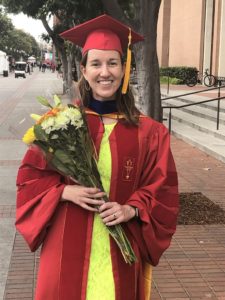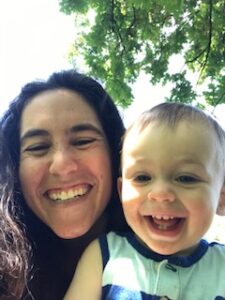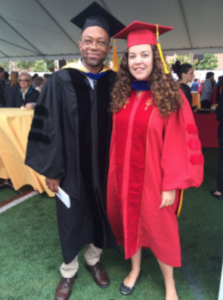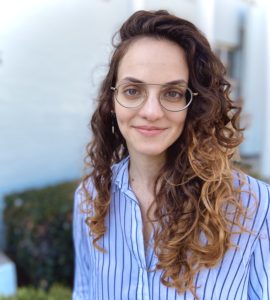Katie Galbraith
 Katie is a graduate student in the clinical science program at USC. She received her B.S. in Psychology from Yale University in 2016. While at Yale she worked at both the Innovative Interactions Lab and the Program for Obesity, Weight, and Eating Research. After graduation, she began working at the Juvenile Justice Behavioral Health lab at the University of California, San Francisco.
Katie is a graduate student in the clinical science program at USC. She received her B.S. in Psychology from Yale University in 2016. While at Yale she worked at both the Innovative Interactions Lab and the Program for Obesity, Weight, and Eating Research. After graduation, she began working at the Juvenile Justice Behavioral Health lab at the University of California, San Francisco.
Katie is passionate about improving access to and outcomes of mental health treatment for at-risk and justice-involved adolescents and young adults. Her research interests include the evaluation of substance use interventions for at-risk and justice-involved youth, particularly with respect to the relationship between trauma exposure and substance use outcomes. She is also interested in studying gender-specific risk factors for involvement in the juvenile justice system.
Katie is originally from the East Coast and is an avid Boston sports fan. Outside of work, she loves to travel and go to the beach. She is also slightly obsessed with bulldogs, particularly her family’s bulldogs named Spanky and Darla (pictures available upon request).
Representative papers
Galbraith, K., & Huey, S.J., Jr. (in press). Gender differences in intervention effects on delinquency for justice-involved youth: A preliminary meta-analysis. Journal of Experimental Criminology. VIEW
Galbraith, K., Tarbox, J., & Huey, S.J., Jr. (2023). Assessing the feasibility of Peer Coach Training for disruptive middle school youth: A mixed methods pilot study. Journal of Child & Family Studies, 32(6), 1753-1764. VIEW
Rubenson, M. P., Galbraith, K., Shin, O., Beam, C. R., & Huey, S. J., Jr. (2021). When helping hurts? Toward a nuanced interpretation of adverse effects in gang-focused interventions. Clinical Psychology: Science and Practice, 28(1), 29–39. VIEW
Rubenson, M., Galbraith, K., & Huey, S.J., Jr. (2020). Understanding adverse effects in gang-focused interventions: A critical review. In F. Weerman & C. Melde (Eds). Gangs and troublesome youth groups in the modern age of internet and social media. New York, NY: Springer. VIEW
Galbraith, K., Elmquist, J., White, M.A., Grilo, C.M., & Lydecker, J.A. (2019). Weighty decisions: How symptom severity and weight impact perceptions of bulimia nervosa. International Journal of Eating Disorders, 1-7. VIEW
Marie Gillespie
 Marie Gillespie completed her Ph.D. in Clinical Science at USC in 2019 after earning her B.S. in Psychology (with minors in Criminal Justice and Behavioral Forensics) at the University of Central Florida in 2012. She completed her clinical internship at The Guidance Center in Long Beach and provided community mental health services and school-based consultation to children and families impacted by trauma. Dr. Gillespie is currently completing her postdoctoral fellowship at UC-Irvine in the Biobehavioral Research on Adolescent Development Lab. She was recently awarded a Research Supplement to Promote Diversity in Health-Related Research by the National Institute on Drug Abuse to conduct fMRI research with African-American youth enrolled in a risk-prevention family program as part of an NIH-funded randomized controlled trial. She is interested in conducting translational intervention research for marginalized youth at high-risk of developing mental health disorders and on finding methods of interrupting the intergenerational cycle of incarceration for vulnerable populations. Dr. Gillespie’s work focuses on the intersectionality of intervention development, culture, race, and ethnicity, adolescent development, program evaluation, and the criminal justice system.
Marie Gillespie completed her Ph.D. in Clinical Science at USC in 2019 after earning her B.S. in Psychology (with minors in Criminal Justice and Behavioral Forensics) at the University of Central Florida in 2012. She completed her clinical internship at The Guidance Center in Long Beach and provided community mental health services and school-based consultation to children and families impacted by trauma. Dr. Gillespie is currently completing her postdoctoral fellowship at UC-Irvine in the Biobehavioral Research on Adolescent Development Lab. She was recently awarded a Research Supplement to Promote Diversity in Health-Related Research by the National Institute on Drug Abuse to conduct fMRI research with African-American youth enrolled in a risk-prevention family program as part of an NIH-funded randomized controlled trial. She is interested in conducting translational intervention research for marginalized youth at high-risk of developing mental health disorders and on finding methods of interrupting the intergenerational cycle of incarceration for vulnerable populations. Dr. Gillespie’s work focuses on the intersectionality of intervention development, culture, race, and ethnicity, adolescent development, program evaluation, and the criminal justice system.
Publications
Wood, M.E., Anderson, J.L., Gillespie, M.L., Alexander, A.A., Backstrom-Sieh, T., & Glassmire, D.M. (2018). The association between specific competence-related abilities and competence restoration treatment. The Journal of Forensic Psychiatry & Psychology. VIEW
Gillespie, M., Huey, S.J., Jr., & Cunningham, P. (2017). Predictive validity of an observer-rated adherence protocol for multisystemic therapy with juvenile drug offenders. Journal of Substance Abuse Treatment, 76, 1-10. VIEW
Taona Haderlein

Taona received her Ph.D. in clinical science from USC in 2016. She is currently a health services researcher and quantitative data analyst at the Center for the Study Healthcare Innovation, Implementation, & Policy (CSHIIP), VA Greater Los Angeles Healthcare System. Her research aims to optimize healthcare quality and access within the VA Healthcare system. Taona’s research interests include 1) telemedicine interventions for eating disorders & post-traumatic stress disorder, 2) women’s mental health, and 3) healthcare disparities in underserved populations. She has also utilized VA data to examine the intersection between these topics and Covid-19 testing/test positivity as part of the VA’s response to the pandemic
Publications
Haderlein, T.P., Yano, E.M., Hamilton, A.B., Chang, E.T. (2020). Assessing mental health diagnoses & mental health service utilization among high-risk women veterans. Presented at the Society for General Internal Medicine Annual Meeting.
Haderlein, T.P. (2019). Technology-based interventions for eating disorders: A meta-analysis. Current Psychology. doi: 10.1007/s12144-019-00448-x
Chithambo, T.P., & Huey, S.J., Jr. (2017). Internet-delivered eating disorder prevention: A randomized controlled trial of dissonance-based and cognitive-behavioral interventions. International Journal of Eating Disorders, 50(1), 1142-1151. VIEW
Nina Jhaveri

Nina takes an interdisciplinary approach to clinical research to address the real-world complexities of health systems and access barriers faced by underserved populations. Ongoing projects include identifying individual-level predictors of patient engagement with mobile health (mHealth) interventions, and exploring the role of primary medical care in mental health service utilization.
Nina’s prior work includes creating public health programs targeting culture-sensitive behavior change in underserved populations. She also developed patient care strategies for U.S. health systems as a strategy consultant. Nina received her B.A. in Psychology from the University of California, Berkeley and her M.B.A. from the University of Chicago. She is an avid food lover and power napper.
Representative papers
Jhaveri, K., Cohen, J.A., Barulich, M., Levin, A.O., Goyal, N., Loveday, T., Chesney, M.A., Shumay, D.M. (2020) “Soup cans, brooms, and Zoom:” Rapid conversion of a cancer survivorship program to telehealth during COVID‐19. Psycho‐Oncology, 29: 1424– 1426. VIEW
Mason, A.E., Jhaveri, K., Schleicher, S., Almeida, C., Hartman, A., Wackerly, A., Alba, D., Koliwad, D., Epel, E., Aschbacher, K. (2019). Sweet cognition: The differential effects of glucose consumption on attentional food bias in individuals of lean and obese status. Physiology & Behavior, 206, 264-273.
Mason, A. E., Jhaveri, K., Cohn, M., & Brewer, J. A. (2018). Testing a mobile mindful eating intervention targeting craving-related eating: Feasibility and proof of concept. Journal of Behavioral Medicine, 41(2), 160–173. VIEW
Sayegh, C.S., Huey, S.J., Jr., Zara, E.J., & Jhaveri, K. (2017). Follow-up treatment effects of contingency management and motivational interviewing on substance use: A meta-analysis. Psychology of Addictive Behaviors, 31(4), 403-414.
Eduardo Jones

Eduardo received his Ph.D. in Clinical Science from USC in 2017. He completed his clinical internship at the VA Pacific Islands Health Care System in Honolulu, and his postdoctoral residency at the Vallejo Kaiser Permanente Medical Center, Department of Psychiatry. He is currently the Director of Behavioral Health at Sutter Health Kāhi Mōhala, a psychiatric inpatient hospital in Hawaii. His clinical and research interests include a) evaluating psychosocial intervention effectiveness, b) cultural considerations in psychotherapy, and c) trauma-informed care.
Publications
Jones, E., Huey, S.J., Jr. (2020). Affirmation and majority students: Does affirmation impair academic performance in White males. Basic and Applied Social Psychology, 42(3), 176-191. VIEW
Jones, E., Huey, S.J., Jr., & Rubenson, M. (2018). Cultural competence in therapy with African Americans. In C.L. Frisby & W. O’Donohue (Eds.) Cultural competence in applied psychology: Theory, science, practice, & evaluation (pp.557-573). Cham, Switzerland: Springer.VIEW
Huey, S.J., Jr., Tilley, J.L., Jones, E.O., & Smith, C.A. (2014). The contribution of cultural competence to evidence-based care for ethnically diverse populations. Annual Review of Clinical Psychology, 10, 305-338. VIEW
Gabrielle Lewine
 Gabby graduated with her PhD in Clinical Science from USC in 2019. She is currently completing her postdoctoral fellowship at the VA Los Angeles Ambulatory Care Center, with a focus in primary care-mental health integration (PC-MHI) and substance use disorders. Starting in September 2020, she will be working full-time as a staff psychologist in PC-MHI at the VA Sepulveda Ambulatory Care Center, where she also completed her clinical internship. Gabby’s research interests include cognitive dissonance-based interventions and sexism; her clinical interests include PC-MHI, substance use disorders, and couple therapy.
Gabby graduated with her PhD in Clinical Science from USC in 2019. She is currently completing her postdoctoral fellowship at the VA Los Angeles Ambulatory Care Center, with a focus in primary care-mental health integration (PC-MHI) and substance use disorders. Starting in September 2020, she will be working full-time as a staff psychologist in PC-MHI at the VA Sepulveda Ambulatory Care Center, where she also completed her clinical internship. Gabby’s research interests include cognitive dissonance-based interventions and sexism; her clinical interests include PC-MHI, substance use disorders, and couple therapy.
Publications
Grigorenko, E. L., Bick, J., Campbell, D., Lewine, G., Abrams, J., Nguyen, V., & Chang, J. T. (2016). The Triology of GxE: Conceptualization, operationalization, and application. In D. Cicchetti (Ed.), Developmental Psychopathology (3rd ed.). VIEW
Huey, S.J., Jr., Lewine, G., & Rubenson, M. (2016). A brief review and meta-analysis of gang intervention trials. In C.L. Maxson & F. Esbensen (Eds.) Gang transitions and transformations in an international context (pp. 217-233). New York: Springer. VIEW
Miriam Rubenson

Miriam Rubenson received her Ph.D. in clinical science from USC in 2021. She completed her clinical internship at Didi Hirsch Mental Health Services child/family track. She currently works as a postdoctoral fellow at Seattle Children’s Hospital Dialectical Behavior Therapy team and partial hospital program. Her work focuses on adolescent suicidality and self-harm, and increasing access to free and low-cost mental health services. She loves reading, making art of all kinds (lately digital illustration, animation, and knitting), cooking, and dancing and story time with her toddler and husband.
Representative papers
Rubenson, M. P., Galbraith, K., Shin, O., Beam, C. R., & Huey, S. J., Jr. (2021). When helping hurts? Toward a nuanced interpretation of adverse effects in gang-focused interventions. Clinical Psychology: Science and Practice, 28(1), 29–39. VIEW
Rubenson, M., Galbraith, K., & Huey, S.J., Jr. (2020). Understanding adverse effects in gang-focused interventions: A critical review. In F. Weerman & C. Melde (Eds). Gangs in the era of internet and social media (pp. 271-290). New York, NY: Springer.VIEW
Cheung, P., Rubenson, M., & Barner, D. (2017). To infinity and beyond: Children generalize the successor function to all possible numbers years after learning to count. Cognitive Psychology, 92, 22-36. VIEW
Jones, E., Huey, S.J., Jr., & Rubenson, M. (2018). Cultural competence in therapy with African Americans. In C.L. Frisby & W. O’Donohue (Eds.) Cultural competence in applied psychology: Theory, science, practice, & evaluation (pp.557-573). Cham, Switzerland: Springer. VIEW
Huey, S.J., Jr., Lewine, G., & Rubenson, M. (2016). A brief review and meta-analysis of gang intervention trials. In C.L. Maxson & F. Esbensen (Eds.) Gang transitions and transformations in an international context (pp. 217-233). New York: Springer. VIEW
Caitlin Smith Sayegh

Caitlin recieved her Ph.D. in clinical science from USC in 2015. Currently, she is an Assistant Professor of Clinical Pediatrics at USC Keck School of Medicine and a licensed clinical psychologist in the Children’s Hospital Los Angeles Division of Adolescent and Young Adult Medicine. Dr. Sayegh conducts research on mobile health (mHealth) and brief psychosocial intervention to promote illness self-management skills, medical adherence, and motivation to change among adolescents and young adults. She is part of the 2020-2023 cohort of early career scholars participating in Mentored Career Development in Clinical and Translational Science Program at the Southern California Clinical and Translational Science Institute. Dr. Sayegh delivers evidence-based psychotherapy and assessment services to youth through a contract with the Los Angeles County Department of Mental Health.
Contact Info: cssayegh@chla.usc.edu Phone: 323-361-7748
Publications
Sayegh, C.S., Hall-Clark, B., McDaniel, D.D., Halliday-Boykins, C.A., Cunningham, P.B., & Huey, S.J., Jr. (2019). A preliminary investigation of ethnic differences in resistance in Multisystemic Therapy. Journal of Clinical Child and Adolescent Psychology, 48(supposed. 1), S13-S23. VIEW
Sayegh, C.S., Szmuszkovicz, J.R., Menteer, J., Sherer, S., Thomas, D., Lestz, R., & Belzer, M. (2018). Cell phone support to improve medication adherence among solid organ transplant recipients. Pediatric Transplantation, 22(6). https:/doi.org/10.1111/petr.13235. VIEW
Sayegh, C.S., MacDonell, K.K., Clark, L.F., Dowshen, N.L., Naar, S., Olson-Kennedy, J., … Belzer, M. (2018). The impact of cell phone support on psychosocial outcomes for youth living with HIV non adherent to antiretroviral therapy. AIDS and Behavior, 22(10), 3357-3362. doi: 10.1007/s10461-018-2192-4. VIEW
Jacqueline Lee Tilley
 Jacqueline graduated with a Ph.D. in Psychology (Clinical Science) in 2019 and is currently a research fellow at the Institute of Policy Studies, Lee Kuan Yew School of Public Policy, National University of Singapore. Jacqueline is broadly interested in understanding how sociocultural factors impact the development of mental health problems and its treatment. When she is not working, Jackie engages in pro-level juggling of her other commitments in life: motherhood and marriage.
Jacqueline graduated with a Ph.D. in Psychology (Clinical Science) in 2019 and is currently a research fellow at the Institute of Policy Studies, Lee Kuan Yew School of Public Policy, National University of Singapore. Jacqueline is broadly interested in understanding how sociocultural factors impact the development of mental health problems and its treatment. When she is not working, Jackie engages in pro-level juggling of her other commitments in life: motherhood and marriage.
Publications
Tilley, J.L., Huey, S.J., Jr., Farver, J.M., Lai, M.H.C., Wang, C.X. (2021). The immigrant paradox in the problem behaviors of youth in the United States: A meta-analysis. Child Development, 92(2), 502-516.VIEW
Tilley, J.L., Farver, J., & Huey, S.J., Jr. (2020). Culture, causal attribution, and coping in ethnic Chinese college students in the United States. Asian American Journal of Psychology, 11(2), 79-87. VIEW
Huey, S.J., Jr., & Tilley, J.L. (2018). Effects of mental health interventions with Asian Americans: A review and meta-analysis. Journal of Consulting & Clinical Psychology, 86(11), 915-930. VIEW
Huey, S.J., Jr., Tilley, J.L., Jones, E.O., Smith, C.A. (2014). The contribution of cultural competence to evidence-based care for ethnically diverse populations. Annual Review of Clinical Psychology, 10, 305-338. VIEW
Sylvanna M. Vargas

Sylvanna M. Vargas, PhD, MPH is a former doctoral student in Dr. Huey’s lab. She is currently an NIMH T32 Postdoctoral Fellow in Child Mental Health and Intervention at the UCLA Semel Institute. At UCLA, she is mentored by Dr. Anna Lau and Drs. Joan Asarnow and Jeanne Miranda. Sylvanna received her PhD and a Master of Public Health from USC in 2021, after completing her predoctoral psychology internship at the West LA VA Medical Center. She received her BA from McGill University in 2011. During her PhD, she was co-mentored by Drs. Stanley Huey at USC and Jeanne Miranda at UCLA. Her graduate research examined sociocultural risk and resilience factors related to mood disorders and suicidality among high-risk, vulnerable populations. During her postdoc, she is receiving training in dissemination and implementation science with a focus on interventions that reduce disparities in suicide among youth of color and sexual and gender minority youth. She has been awarded the 2021 Ford Foundation Postdoctoral Fellowship, the 2017 Foundation Predoctoral Fellowship, and the American Psychological Foundation/ Council of Graduate Departments of Psychology Ruth G. and Joseph D. Matarazzo Scholarship. Sylvanna was born in Honduras and is of Nicaraguan descent. She grew up moving around several countries, including spending much of her childhood in Costa Rica and Miami.
Representative papers
Vargas, S.M., Wang, C., Jafarzadeh, N., Rubenson, M., & Huey, Jr., S. J. (in press). Depression, perceived burdensomeness, thwarted belongingness, and suicide risk trajectories among emerging adults during the early COVID-19 pandemic. Journal of Social and Clinical Psychology.
Vargas, S. M., Calderon, V., Beam, C. R., Cespedes-Knadle, Y., N., & Huey, S. J., Jr. (2021). Worse for girls?: Gender differences in discrimination as a predictor of suicide risk among Latinx youth. Journal of Adolescence, 88, 162-171. VIEW
Vargas, S.M., Huey, S.J., Jr., & Miranda, J. (2020). A critical review of current evidence on multiple types of discrimination and mental health. American Journal of Orthopsychiatry, 90(3), 374-390. VIEW
Vargas, S.M., Dere, J., Garcia, L., & Ryder, A. G. (2019). The role of cultural values in the Folk Psychiatry explanatory framework: A comparison of Chinese- and Euro-Canadians. Journal of Cross-Cultural Psychology. VIEW
Doucerain, M., Vargas, S., & Ryder, A. G. (2016). Mixed-methods research: Integrating qualitative and quantitative approaches to the psychological study of culture. In N. Zane, G. Bernal, & F. Leong (Eds.), Culturally-informed evidence-based practice for ethnic minorities: Challenges and solutions. Washington, DC: American Psychological Association. VIEW
Vargas, S. M., Cabassa, L. J., Nicasio, A., De La Cruz, A. A., Jackson, E., Rosario, M., … & Lewis-Fernández, R. (2015). Toward a cultural adaptation of pharmacotherapy: Latino views of depression and antidepressant therapy. Transcultural Psychiatry, 52(2), 244-273. VIEW
Crystal Wang
 Crystal is a clinical psychology Ph.D. student. She received her B.A. from U.C. Berkeley in 2015, where she conducted a study assessing the impact of language on implicit attitudes towards Asian Americans. At USC, she ran several studies investigating the effects of ethnicity and culture on mental health stigma for her master’s thesis. This transitioned to her dissertation project, where she is currently testing a novel, culturally-relevant social norms intervention for mental health stigma and help-seeking with depressed Asian and European American college students. Other ongoing projects include examining the effects of threat on racial bias and xenophobia, and how social context influences engagement in problem behaviors.
Crystal is a clinical psychology Ph.D. student. She received her B.A. from U.C. Berkeley in 2015, where she conducted a study assessing the impact of language on implicit attitudes towards Asian Americans. At USC, she ran several studies investigating the effects of ethnicity and culture on mental health stigma for her master’s thesis. This transitioned to her dissertation project, where she is currently testing a novel, culturally-relevant social norms intervention for mental health stigma and help-seeking with depressed Asian and European American college students. Other ongoing projects include examining the effects of threat on racial bias and xenophobia, and how social context influences engagement in problem behaviors.
Outside of research, Crystal enjoys traveling, making trips up north to visit her family, and drinking trenta-sized americanos to stay awake.
Representative papers
Huey, S.J., Jr., Park, A.L., Galan, C., & Wang, C.X. (2023). Culturally-responsive cognitive behavioral therapy for ethnically diverse populations. Annual Review of Clinical Psychology, 19(1), 51-78. VIEW
Wang, C.X., Huey, S.J., Jr., & Pan, D. (2021). Therapeutic alliance mediates the effect of directive treatment on subsyndromal depression for Asian and European American students. Journal of Psychotherapy Integration, 31(3), 291-301. VIEW
Tilley, J.L., Huey, S.J., Jr., Farver, J.M., Lai, M.H.C., Wang, C.X. (2021). The immigrant paradox in the problem behaviors of youth in the United States: A meta-analysis. Child Development, 92(2), 502-516. VIEW